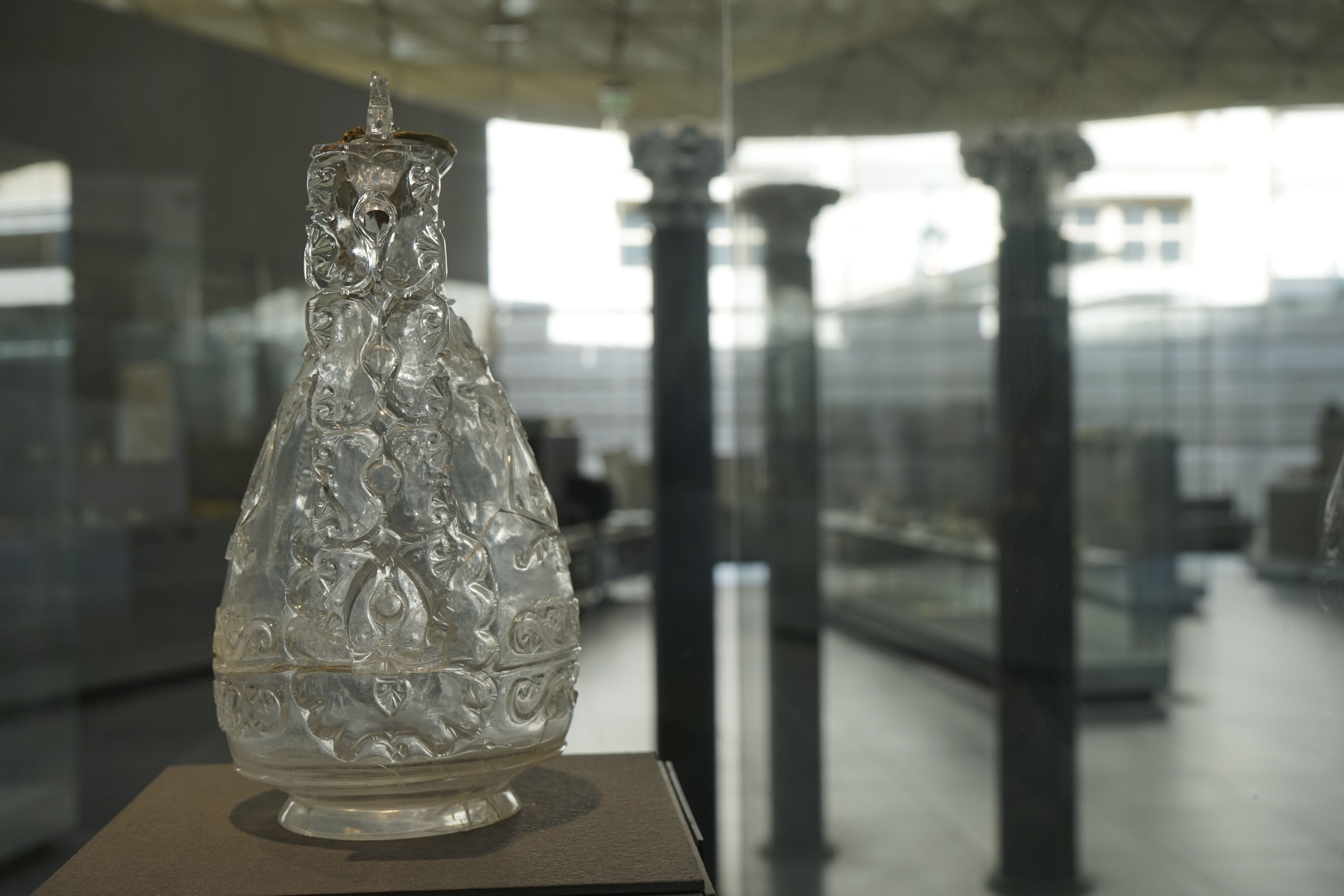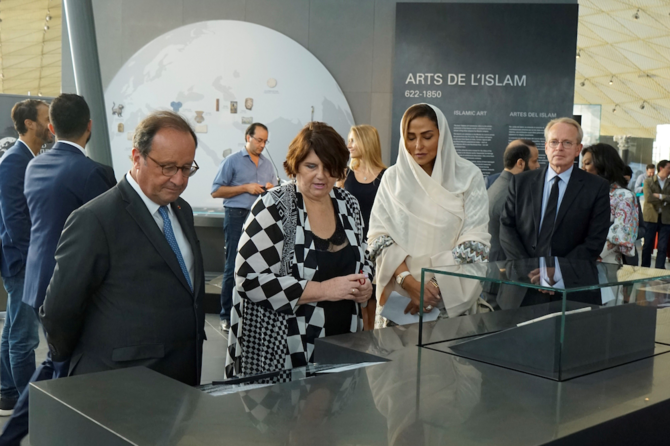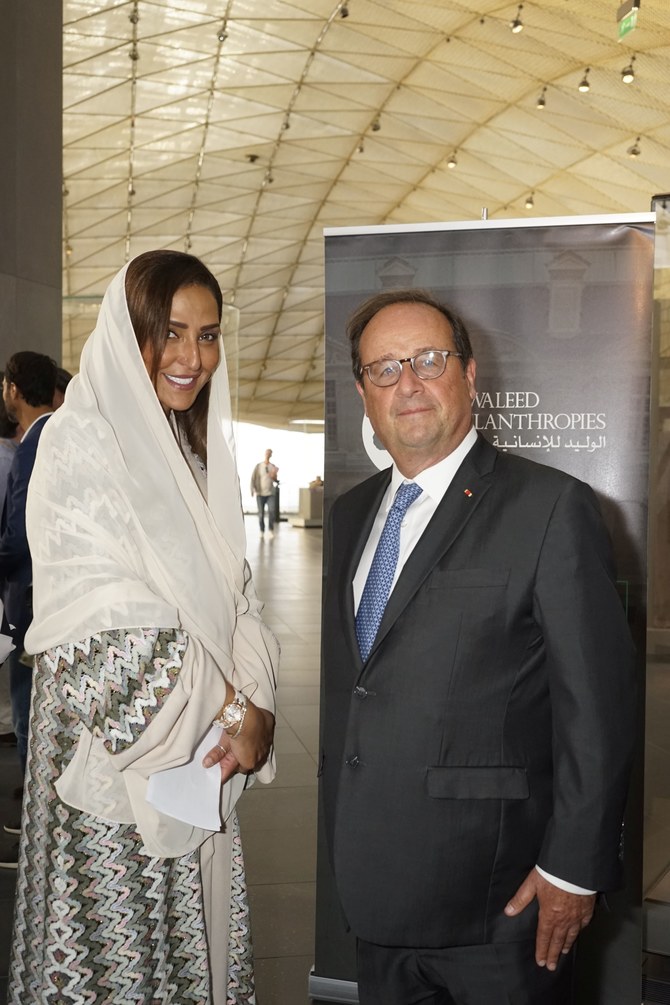PARIS: As tourists wander into the Louvre Museum courtyard, a 15-meter banner hanging on the wall of the grand building emblazoned with a Renaissance portrait by one of Europe’s old masters is an instant reminder of who and what they are here to see.
Leonardo da Vinci’s work at the museum, and his ‘Mona Lisa’ in particular, pulls in huge crowds, with thousands queuing each day, all year round.
From this week, there will be a new attraction that marks a high point of cultural cooperation between France and the Arab world, and it is well worth the admission fee.
The newly expanded space for Islamic art at the Louvre was unveiled on Tuesday, showcasing 3,000 pieces and artefacts across 12 centuries of Islamic history from locations ranging from southern Spain to northern India.

The newly expanded space for Islamic art at the Louvre was unveiled on Tuesday, which will showcase 3,000 pieces and artifacts across 12 centuries of Islamic history from locations as wide-ranging as southern Spain to northern India. (Alwaleed Philanthropies)
The expansion was made possible with support from, and in partnership with, Saudi Arabia’s Alwaleed Philanthropies.
While the foundation carries out work in numerous fields from women’s empowerment to disaster relief across the globe, this cultural tie-up with the Louvre is a fruitful and long-running partnership. It dates back to 2002 and led to the foundation donating $23 million in 2005 to help to construct the museum’s Department of Islamic Art.
The collaboration’s importance to both parties was made clear in an address from Alwaleed Philanthropies’ general secretary, Princess Lamia bint Majed Al-Saud, at the launch attended by the former French president Francois Hollande.
The partnership is built on more than run-of-the-mill donations by benevolent collectors; it is a project with a clear mission of spreading a message of peace and tolerance — one that Princess Lamia is particularly passionate about.

The newly expanded space for Islamic art at the Louvre was unveiled on Tuesday, which will showcase 3,000 pieces and artifacts across 12 centuries of Islamic history from locations as wide-ranging as southern Spain to northern India. (Alwaleed Philanthropies)
“Prince Alwaleed believes very much in dialogue and promoting tolerance and understanding, and that is one of the core areas of focus for the foundation,” she told Arab News.
“The prince also believes in the power of art, so this collaboration is very important, as we share (with the Louvre) a vision and a perspective that we need to use art to create that world of tolerance and understanding.
“This partnership is one of our biggest initiatives and, for me personally, the one I’m most proud of because it reflects how we want people to see Islam and this part of the world. I’m very glad that we share this vision.
“Islamic art and heritage, at the end of the day, reflects what Islam is and what this part of the world was,” she added.
FASTFACT
Saudi-French cultural ties
The partnership between Alwaleed Philanthropies and the Louvre is the latest in a series of cultural tie-ups between Saudi Arabia and France following Crown Prince Mohammed bin Salman’s visit to France last year. The visit saw the signing of several cooperation agreements ranging from setting up a national opera to developing tourism around archaeological sites such as AlUla as well as an exhibition called “Saudi Cultural Days” highlighting the culture and arts scene in the Kingdom.
The inspiration for this latest expansion and development of the Louvre’s Islamic Art Department was born out of a 2016 meeting between the princess and department director Yannick Lintz after two major terrorist incidents in France the previous year in which more than 140 people were killed by militants.
Those two barbaric acts made Lintz realize there was a need for a change in how centers of culture and education such as the Louvre used art and heritage to better answer questions about Islam and its rich cultural background.
“It is important to show the true history and range of this exceptional culture and its contribution to, and interaction with, humanity’s collective artistic canon,” she said.
It is a point Princess Lamia believes cannot be made strongly enough.
“There had been a huge distortion in the vision and the picture of our part of the world and of the Islamic religion in general,” the princess said.
“I think art is the only language that has no barriers, no restrictions and it does not reflect any race or gender. To use art was a very smart move on the part of Prince Alwaleed, and to pick this project reflects how we (as a foundation) appreciate art and how we promote and support that.
“The education department here is very important, especially as we enter a digital era and look to implement more interactivity. I hope people can understand and view things from our perspective and we can succeed in reflecting an image that we are all alike and we can understand each other through art,” she added.

Princess Lamia addressing dignitaries and media at the unveiling of the newly launched spaces at the Islamic Art Department of the Louvre. (Alwaleed Philanthropies)
The foundation’s commitment to bridging cultural gaps through art and heritage is an ongoing project. A further collaboration with the Pergamon Museum in Berlin will have a “very unique piece” on display, Princess Lamia told Arab News.
She also highlighted Alwaleed Philanthropies’ six centers at prestigious universities such as Cambridge, Edinburgh, Georgetown and Harvard, saying: “At Cambridge and Edinburgh, we have very interesting pieces of Islamic heritage. We have this message we want to spread and we do it via many different projects.”
The Louvre’s Islamic art collection is one of the most extensive of its kind and is expected to attract hundreds of thousands of visitors — a model Saudi Arabia is looking to emulate as part of its Vision 2030 and its plans to showcase the best of Saudi culture and heritage.
When asked by Arab News if she envisages similar exhibitions of specifically Saudi art and heritage on the horizon, Princess Lamia said: “I believe it will happen soon, we have a lot of beautiful pieces, but tradition and mindsets did make it difficult to get pieces out of the country.
“But I think with the new minister of culture Prince Badr Al-Farhan, the vision of King Salman and Crown Prince Mohammed bin Salman and jewels like Ithra, Al-Ula and Al-Soudah, we are giving a lot of attention to heritage and it’s what we need to do. It’s just the beginning.”






































